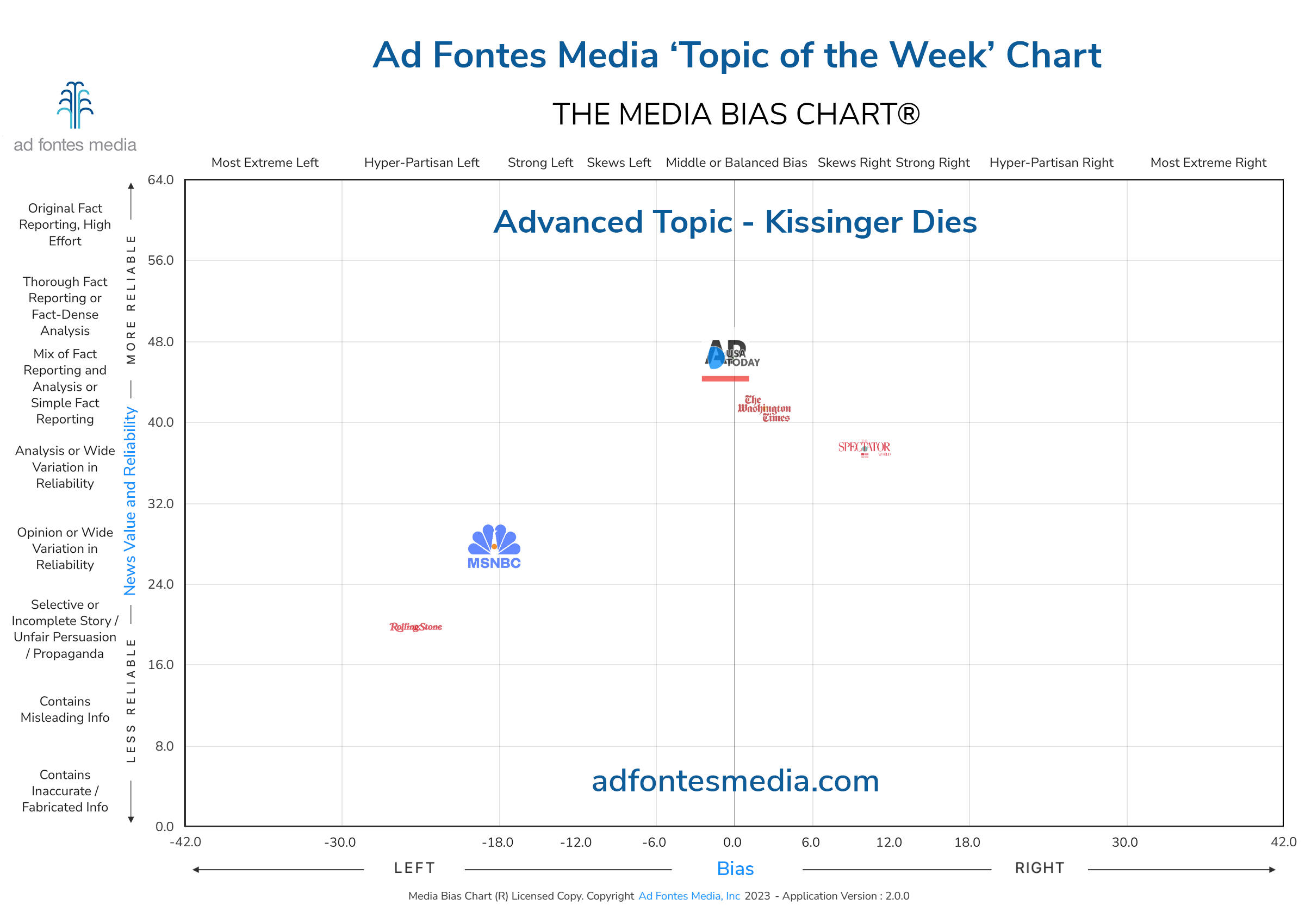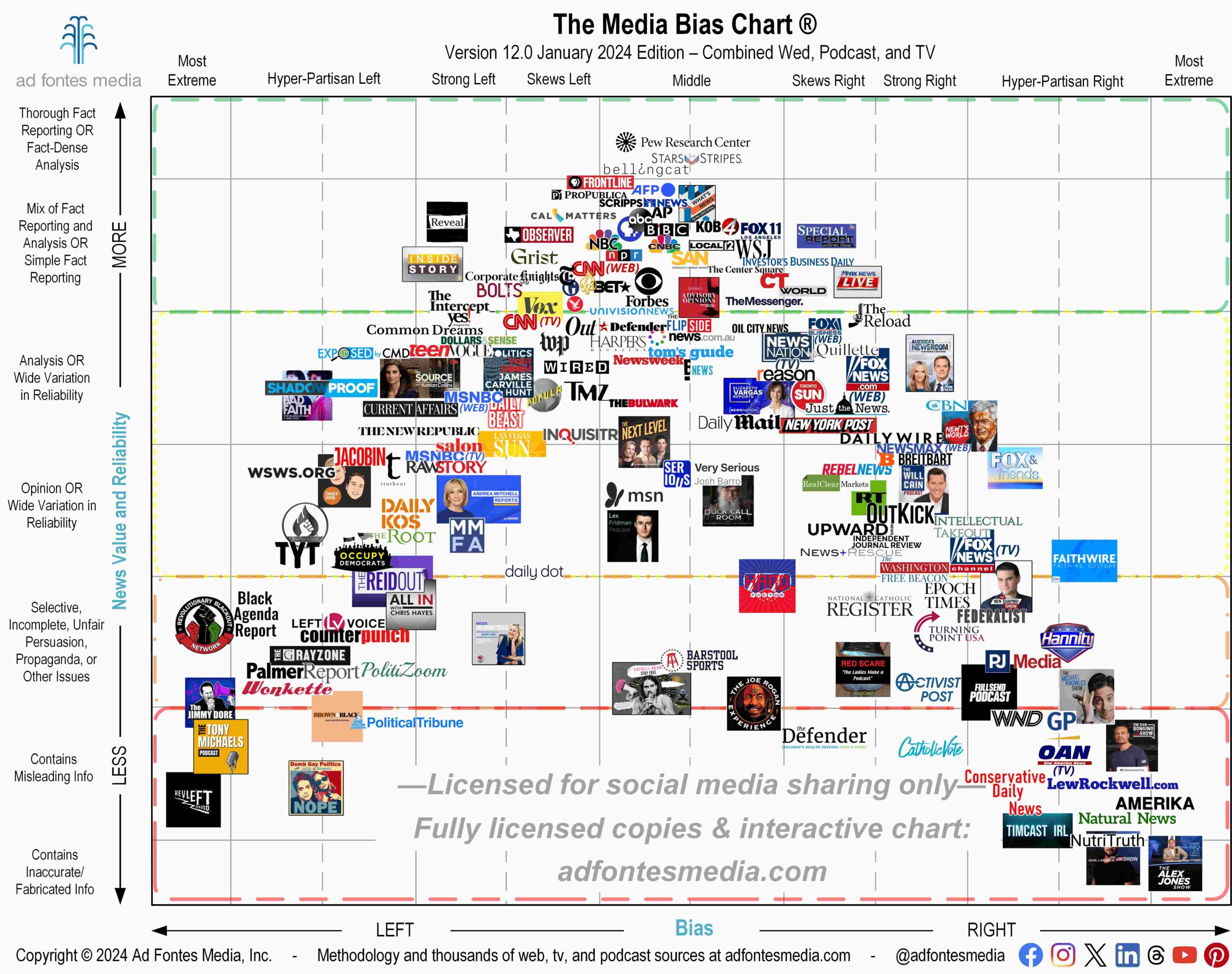Menu

Media Bias Chart Dissects Perspectives of Henry Kissinger’s Legacy
Ad Fontes Media explains bias, reliability, and polarized reactions in this week’s Topic of the Week
Author:
Sara Webb
Date:
12/08/2023
American diplomat Henry Kissinger died on Nov. 29, 2023, at the age of 100, and media coverage of Kissinger’s death, life and legacy was extensive. Analysts took a closer look at several of these articles in this week’s Topic of the Week.
Each week, Ad Fontes Media chooses a widely covered trending news topic to share insight into how our analysts rank news coverage for the Media Bias Chart®. To do this, we select six articles reporting on the same story from different outlets to show how each treated the subject.
Once we choose a set of articles, pods of analysts with diverse political perspectives (one right leaning, one center, and one left leaning) read each article and use Ad Fontes Media’s content analysis methodology to determine its bias and reliability. These ratings inform the articles’ placement on that week’s special Media Bias Chart.
The articles rated by our analysts were “Henry Kissinger, War Criminal Beloved by America’s Ruling Class, Finally Dies” from Rolling Stone, “Henry Kissinger, ‘dependable and distinctive’ voice on foreign affairs, dies at 100” from The Washington Times, “How Henry Kissinger shaped the Cold War world” from The Spectator, “Henry Kissinger, a statesman who indelibly shaped US foreign policy, dies at 100” from USA Today, “Henry Kissinger’s legacy is best measured in bodies” from MSNBC, and “Henry Kissinger was a trusted confidant to President Nixon until the bitter, bizarre end” from The Associated Press. The bias and reliability scores for each of these articles can be found on our Topic of the Week page.
It’s time for a brief history lesson, and one that is reflected in the content of most of the center and right-leaning articles in this set. Henry Kissinger was arguably best known for his role as Secretary of State under both President Richard Nixon and President Gerald Ford, playing a dominant role in U.S. foreign policy between 1969-1977. He pioneered the policy of détente with the former Soviet Union, orchestrated an opening of relations with China, engaged in “shuttle diplomacy” in the Middle East to end the Yom Kippur War, and negotiated the Paris Peace Accords, which ended American involvement in the Vietnam War.
On the surface, these statements of his record seem like a fairly standard encyclopedia entry, but this week’s left-leaning sources chose to focus not on the benefits these accomplishments brought to the U.S. and the world but on the concessions he made in order to secure these deals and relationships. Let’s take a closer look at articles from MSNBC and Rolling Stone.
Ad Fontes Media has rated the MSNBC website with an aggregate score of 34.71 for reliability, putting it in the analysis or wide variation in reliability area, and with -14.21 for bias, giving it a strong left lean. This week’s article was rated at a 27.67 for reliability, putting it in the opinion or wide variation in reliability category, and -18.33 for bias, placing it just over the line into hyper-partisan left.
This opinion piece is authored by international relations major and staff writer Hayes Brown, who writes primarily on American politics. Aside from the title stating that Kissinger’s legacy is best measured in bodies, the subtitle asserts that he “never showed remorse for the thousands upon thousands whose lives he helped cut short.” Our analysts noted that the author continues with that tone throughout the article.
Brown wrote, “The outpouring that accompanied his death was not so much grief as recognition that the end had finally come for a man who eluded death in a way that defied karma or cosmic justice.” He pointed out that during the Vietnam War, Kissinger advocated carpet bombing neighboring Cambodia, and “though no firm numbers exist, anywhere from 150,000-500,000 civilians were killed as a result of that campaign… The screams of those long dead that still echo through history may never be truly put to rest but, at least now, if the universe is at all just, Kissinger can hear them himself.”
This author’s use of vivid imagery to paint Kissinger as nothing more than a villain is imposing and meant to persuade; however, it is a tool of distraction. The more an article uses subjective terms to describe something or someone, the less objective it becomes.
Rolling Stone has been rated with an aggregate score of 27.92 for reliability, putting it in the opinion or wide variation in reliability area, and -13.06 for bias, giving it a strong left lean. This week’s article was rated at 19.67 for reliability, putting it in the selective or incomplete story section of the chart, and -24.33 for bias, putting it firmly in the hyper-partisan left category. This article garnered the most extreme scores of any from this week’s set, and after reading it, it is not hard to find out why. The subtitle begins along the same lines as the MSNBC article, but then goes a step further: “The infamy of Nixon’s foreign-policy architect sits, eternally, beside that of history’s worst mass murderers. A deeper shame attaches to the country that celebrates him.”
This article is a no-holds-barred explanation of all of the lives that were changed or ended under Kissinger’s tenure. The author wrote, “Yale University historian Greg Grandin… estimates that Kissinger’s actions from 1969 through 1976, a period of eight brief years when Kissinger made Richard Nixon’s and then Gerald Ford’s foreign policy as national security adviser and secretary of state, meant the end of between three and four million people. That includes ‘crimes of commission,’ he explained, as in Cambodia and Chile, and omission, like greenlighting Indonesia’s bloodshed in East Timor; Pakistan’s bloodshed in Bangladesh; and the inauguration of an American tradition of using and then abandoning the Kurds.”
According to this article, there were no redeeming qualities about this man or about the country that gave him free rein to act in our perceived best interests on the international stage. The author continued, Kissinger was “a practitioner of American greatness, and so the press lionized him as the cold-blooded genius who restored America’s prestige from the agony of Vietnam” and, “Not once in the half-century that followed Kissinger’s departure from power did the millions the United States killed matter for his reputation, except to confirm a ruthlessness that pundits occasionally find thrilling.”
Our analysts identified all of these examples and more, but the most poignantly biased line was tucked in at the end of the Rolling Stone article: “What were the lives of Vietnamese, Cambodians, or Iraqis compared to Kissinger’s opportunity to help shape history?”
These are just two examples of the thousands of articles our analysts have rated for reliability and bias. If you want a look at the larger media landscape or are curious to see how our analysts have rated your favorite sources, head on over to our website and check out the resources we have available. And don’t forget to come back for another examination of the Topic of the Week.
And if you want to stay informed on all of our amazing work, join our free mailing list!


